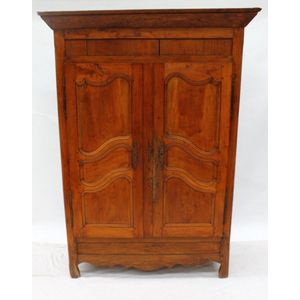17th Century Italian Walnut and Gilt Credenza
You must be a subscriber, and be logged in to view price and dealer details.
Subscribe Now to view actual auction price for this item
When you subscribe, you have the option of setting the currency in which to display prices to $Au, $US, $NZ or Stg.
- Apron - A decorative wooden panel that sits underneath the top surface of a table or chair, and unites the top of the piece with the legs, running at right angles to the underside. On carcase furniture such as a chest or wardrobe, the apron sits below the drawers or doors and attaches to the legs.
On carcase furniture without legs the panel under the drawers or doors sits on the floor and is termed a plinth.
An apron can provide a decorative touch to an otherwise unadorned piece of furniture and at the same time provide structural support and strength. They can be carved or pierced and quite elaborate. - Important - Important is a word used in the antique trade to indicate an object should be ranked above other similar objects, and is therefore more valuable.
The object could be considered important because it is by a famous designer or maker, has been shown at a major exhibition, is of exquisite workmanship, is rare or is a "one-off", was made for an important patron, and so on.
Even further up the pecking order are objects that are described in catalogue descriptions as highly important or extraordinarily important. - Frieze - An architectural term denoting the flat, shaped or convex horizontal surface of furniture, between the architrave and the cornice, usually found on a cabinet or bookcase, or on desks and tables where it may include drawers, the area between the top and the legs. In ceramics, the term refers to the banding, of usually a repeating pattern, on the rims of plates and vases.
- Paw Feet - A paw foot is a base of a furniture leg that resembles the paw of an animal, such as a lion or bear. It is a decorative feature that is often seen in traditional furniture designs, particularly in styles such as Chippendale, Queen Anne, and Georgian. A paw foot typically consists of a carved or moulded ball or disk at the bottom of the leg, which is then carved or shaped to resemble the toes or claws of an animal. The foot may be smooth or textured, depending on the design, and may be finished in a variety of materials, such as wood, metal, or even marble.
Paw feet are often used on heavier pieces of furniture, such as chests, tables, and chairs, to provide additional stability and support. They are also used as a decorative element, adding a touch of elegance and sophistication to the overall design.
"Hairy paw feet" is a term used to describe a variation of the foot design that features a carved or sculpted animal paw, such as a lion or bear, with hair or fur details. The hair or fur details were often carved in a realistic manner and added to the overall decorative effect of the furniture. Hairy paw feet were commonly found on furniture items such as tables, chairs, and cabinets and were popular in the 18th century.
This item has been included into following indexes:
Visually similar items

An early side cabinet in the Regency manner, Australian cedar paneled doors cross banded in blackwood, Tasmanian origin, circa 1830, 106 cm high, 127 cm wide, 44 cm deep

A fine quality George III style amboyna and satinwood bow front cabinet, English, circa 1890, 141 x 100 x 47 cm

An antique French armoire in cherry & oak, three fitted Baltic pine shelves, the original hinges & lock in tact, excellent original condition, 195 x 140 x 51 cm

A carved hardwood cocktail cabinet, of upright rectangular form, carved on the exterior with angular scrolls in relief, the top and hinged front flap opening to reveal double huanghuali panels covering a fitted bottle container, the front with two doors en
